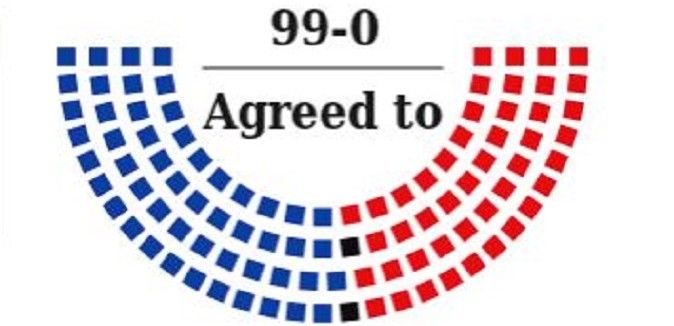The U.S. Senate voted 99-0 yesterday on S.Res. 65, which emphasizes the global threat posed by a nuclear Iran, calls for tightening sanctions on Iran, and reaffirms U.S. support for Israel if the Jewish state takes action to defend itself against the Islamic republic. The text is here and takes extensive note of Iranian intransigence in the context of negotiations over Tehran’s atomic program:
Whereas, since September 2005, the Board of Governors of the International Atomic Energy Agency (IAEA) has found the Islamic Republic of Iran to be
in non-compliance with its safeguards agreement with the IAEA, which Iran is obligated to undertake as a non-nuclear-weapon State Party to the Treaty on the Non-Proliferation of Nuclear Weapons, done at Washington, London, and Moscow July 1, 1968, and entered into force March 5, 1970 (NPT);
Whereas the United Nations Security Council has adopted multiple resolutions since 2006 demanding of the Government of the Islamic Republic of Iran its full and sustained suspension of all uranium enrichment-related and reprocessing activities and its full cooperation with the IAEA on all outstanding issues related to its nuclear activities, particularly those concerning the possible military dimensions of its nuclear program;
Whereas the Government of the Islamic Republic of Iran has refused to comply with United Nations Security Council resolutions or to fully cooperate with the IAEA;
Whereas, in November 2011, the IAEA Director General issued a report that documented “serious concerns regarding possible military dimensions to Iran’s nuclear programme,” and affirmed that information available to the IAEA indicates that “Iran has carried out activities relevant to the development of a nuclear explosive device” and that some activities may be ongoing;
An IAEA report leaked this week indicates that Iran has accelerated the installation of critical nuclear infrastructure. The development will allow Tehran to increase the pace of its uranium enrichment by orders of magnitude.
Meanwhile diplomacy with Iran is stalled, with both IAEA and P5+1 talks having yielded no progress in recent days. There are widespread fears – expressed by U.S., E.U, and U.N. diplomats, Israeli officials, Saudi officials, the head of the IAEA, and top U.S. military officials – that Iran is using the negotiations to stall for time while pursuing a nuclear weapon.
The upcoming Iranian election is unlikely to change the fundamental dynamic.
The resolution urges that – should Jerusalem be forced to act against Iran – the U.S. should provide “diplomatic, military, and economic support to the Government of Israel in its defense of its territory, people, and existence.”
Reporting on the resolution has been confused since before it was moved out of committee, with some observers thinking that it committed the U.S. to going to war on Israel’s behalf. Senators took particular care to insert language emphasizing that – as with all legislation passed by Congress in America – nothing in the bill contradicts unrelated U.S. laws, including Congress’s prerogative to authorize the U.S. to go to war.
[Photo: govtrack.us]




